Analysis of Shell Company: Policies, Operations, and Challenges
VerifiedAdded on 2022/05/05
|14
|3713
|35
Report
AI Summary
This report provides a comprehensive analysis of the Shell company, encompassing its overview, policies, responsibilities, budget, geographic presence, activities, collaborations, challenges, and recommendations. The report delves into Shell's commitment to sustainable development, equal opportunity, and ethical practices, while also examining its financial aspects, global operations, and social corporate responsibilities. It highlights Shell's involvement in various projects and its strategic partnerships. Furthermore, the report identifies challenges faced by Shell, such as environmental concerns and competition, and proposes recommendations to overcome these obstacles. Overall, the report offers a detailed understanding of Shell's business practices, its impact on the environment, and its role in the global energy market.
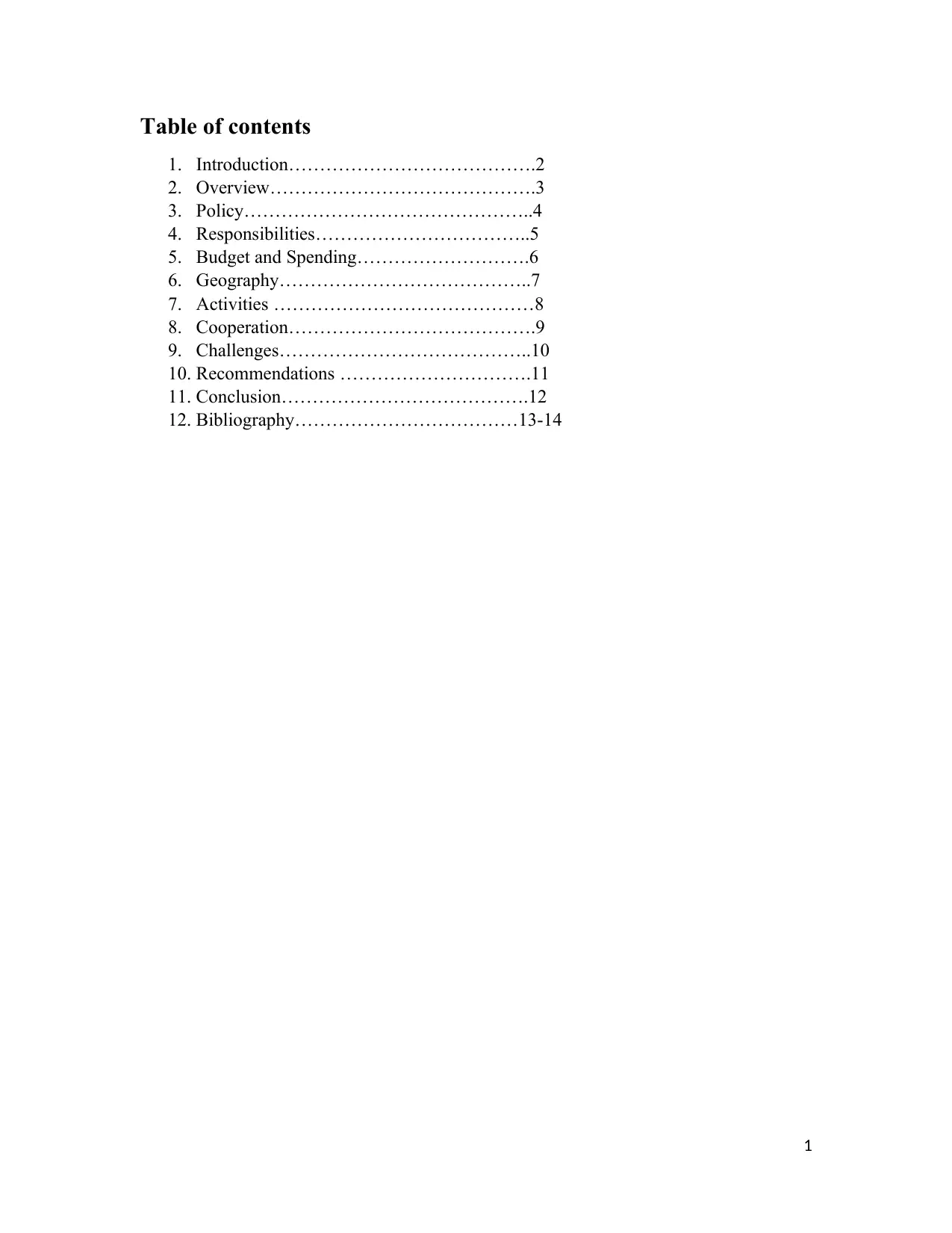
Table of contents
1. Introduction………………………………….2
2. Overview…………………………………….3
3. Policy………………………………………..4
4. Responsibilities……………………………..5
5. Budget and Spending……………………….6
6. Geography…………………………………..7
7. Activities ……………………………………8
8. Cooperation………………………………….9
9. Challenges…………………………………..10
10. Recommendations ………………………….11
11. Conclusion………………………………….12
12. Bibliography………………………………13-14
1
1. Introduction………………………………….2
2. Overview…………………………………….3
3. Policy………………………………………..4
4. Responsibilities……………………………..5
5. Budget and Spending……………………….6
6. Geography…………………………………..7
7. Activities ……………………………………8
8. Cooperation………………………………….9
9. Challenges…………………………………..10
10. Recommendations ………………………….11
11. Conclusion………………………………….12
12. Bibliography………………………………13-14
1
Paraphrase This Document
Need a fresh take? Get an instant paraphrase of this document with our AI Paraphraser
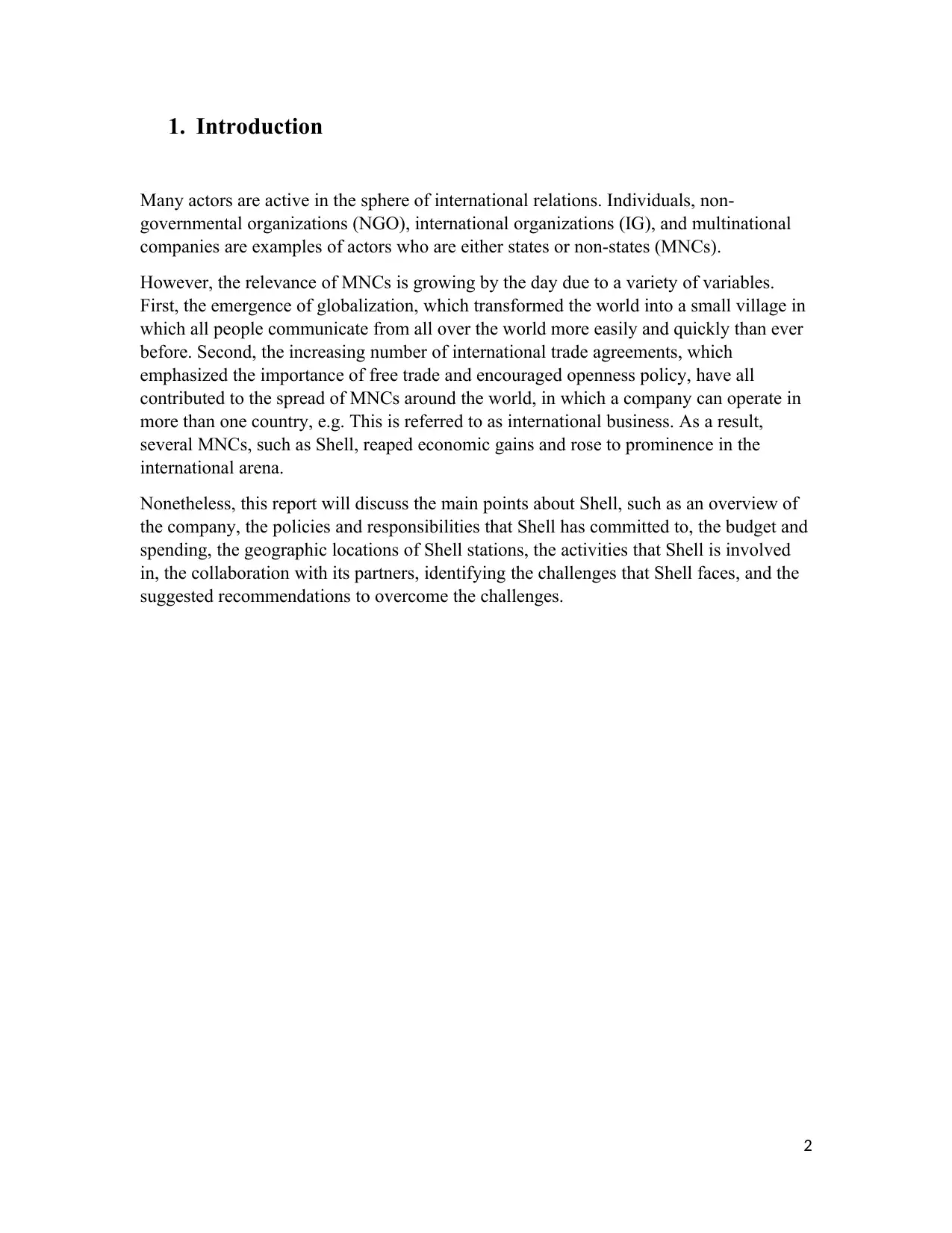
1. Introduction
Many actors are active in the sphere of international relations. Individuals, non-
governmental organizations (NGO), international organizations (IG), and multinational
companies are examples of actors who are either states or non-states (MNCs).
However, the relevance of MNCs is growing by the day due to a variety of variables.
First, the emergence of globalization, which transformed the world into a small village in
which all people communicate from all over the world more easily and quickly than ever
before. Second, the increasing number of international trade agreements, which
emphasized the importance of free trade and encouraged openness policy, have all
contributed to the spread of MNCs around the world, in which a company can operate in
more than one country, e.g. This is referred to as international business. As a result,
several MNCs, such as Shell, reaped economic gains and rose to prominence in the
international arena.
Nonetheless, this report will discuss the main points about Shell, such as an overview of
the company, the policies and responsibilities that Shell has committed to, the budget and
spending, the geographic locations of Shell stations, the activities that Shell is involved
in, the collaboration with its partners, identifying the challenges that Shell faces, and the
suggested recommendations to overcome the challenges.
2
Many actors are active in the sphere of international relations. Individuals, non-
governmental organizations (NGO), international organizations (IG), and multinational
companies are examples of actors who are either states or non-states (MNCs).
However, the relevance of MNCs is growing by the day due to a variety of variables.
First, the emergence of globalization, which transformed the world into a small village in
which all people communicate from all over the world more easily and quickly than ever
before. Second, the increasing number of international trade agreements, which
emphasized the importance of free trade and encouraged openness policy, have all
contributed to the spread of MNCs around the world, in which a company can operate in
more than one country, e.g. This is referred to as international business. As a result,
several MNCs, such as Shell, reaped economic gains and rose to prominence in the
international arena.
Nonetheless, this report will discuss the main points about Shell, such as an overview of
the company, the policies and responsibilities that Shell has committed to, the budget and
spending, the geographic locations of Shell stations, the activities that Shell is involved
in, the collaboration with its partners, identifying the challenges that Shell faces, and the
suggested recommendations to overcome the challenges.
2
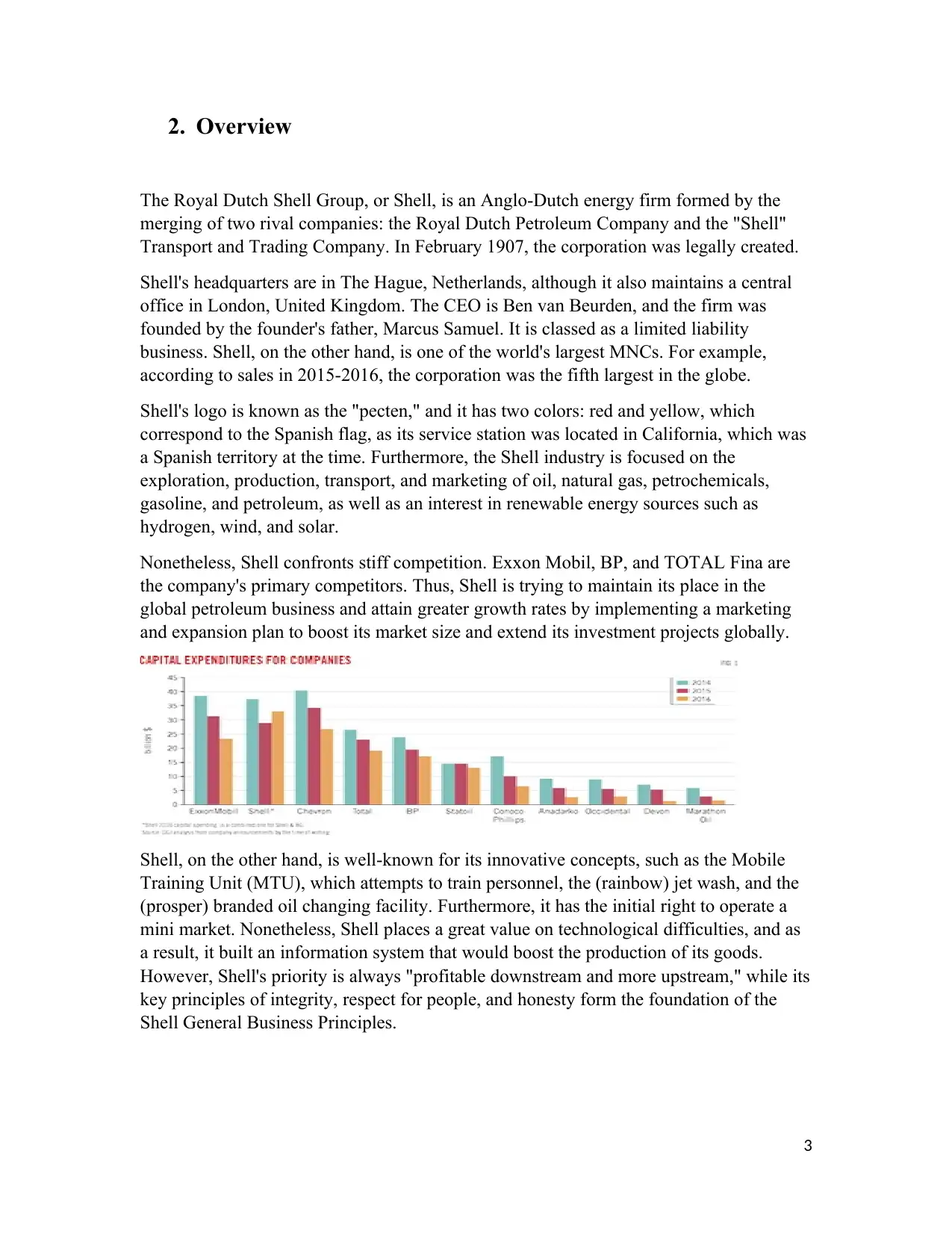
2. Overview
The Royal Dutch Shell Group, or Shell, is an Anglo-Dutch energy firm formed by the
merging of two rival companies: the Royal Dutch Petroleum Company and the "Shell"
Transport and Trading Company. In February 1907, the corporation was legally created.
Shell's headquarters are in The Hague, Netherlands, although it also maintains a central
office in London, United Kingdom. The CEO is Ben van Beurden, and the firm was
founded by the founder's father, Marcus Samuel. It is classed as a limited liability
business. Shell, on the other hand, is one of the world's largest MNCs. For example,
according to sales in 2015-2016, the corporation was the fifth largest in the globe.
Shell's logo is known as the "pecten," and it has two colors: red and yellow, which
correspond to the Spanish flag, as its service station was located in California, which was
a Spanish territory at the time. Furthermore, the Shell industry is focused on the
exploration, production, transport, and marketing of oil, natural gas, petrochemicals,
gasoline, and petroleum, as well as an interest in renewable energy sources such as
hydrogen, wind, and solar.
Nonetheless, Shell confronts stiff competition. Exxon Mobil, BP, and TOTAL Fina are
the company's primary competitors. Thus, Shell is trying to maintain its place in the
global petroleum business and attain greater growth rates by implementing a marketing
and expansion plan to boost its market size and extend its investment projects globally.
Shell, on the other hand, is well-known for its innovative concepts, such as the Mobile
Training Unit (MTU), which attempts to train personnel, the (rainbow) jet wash, and the
(prosper) branded oil changing facility. Furthermore, it has the initial right to operate a
mini market. Nonetheless, Shell places a great value on technological difficulties, and as
a result, it built an information system that would boost the production of its goods.
However, Shell's priority is always "profitable downstream and more upstream," while its
key principles of integrity, respect for people, and honesty form the foundation of the
Shell General Business Principles.
3
The Royal Dutch Shell Group, or Shell, is an Anglo-Dutch energy firm formed by the
merging of two rival companies: the Royal Dutch Petroleum Company and the "Shell"
Transport and Trading Company. In February 1907, the corporation was legally created.
Shell's headquarters are in The Hague, Netherlands, although it also maintains a central
office in London, United Kingdom. The CEO is Ben van Beurden, and the firm was
founded by the founder's father, Marcus Samuel. It is classed as a limited liability
business. Shell, on the other hand, is one of the world's largest MNCs. For example,
according to sales in 2015-2016, the corporation was the fifth largest in the globe.
Shell's logo is known as the "pecten," and it has two colors: red and yellow, which
correspond to the Spanish flag, as its service station was located in California, which was
a Spanish territory at the time. Furthermore, the Shell industry is focused on the
exploration, production, transport, and marketing of oil, natural gas, petrochemicals,
gasoline, and petroleum, as well as an interest in renewable energy sources such as
hydrogen, wind, and solar.
Nonetheless, Shell confronts stiff competition. Exxon Mobil, BP, and TOTAL Fina are
the company's primary competitors. Thus, Shell is trying to maintain its place in the
global petroleum business and attain greater growth rates by implementing a marketing
and expansion plan to boost its market size and extend its investment projects globally.
Shell, on the other hand, is well-known for its innovative concepts, such as the Mobile
Training Unit (MTU), which attempts to train personnel, the (rainbow) jet wash, and the
(prosper) branded oil changing facility. Furthermore, it has the initial right to operate a
mini market. Nonetheless, Shell places a great value on technological difficulties, and as
a result, it built an information system that would boost the production of its goods.
However, Shell's priority is always "profitable downstream and more upstream," while its
key principles of integrity, respect for people, and honesty form the foundation of the
Shell General Business Principles.
3
⊘ This is a preview!⊘
Do you want full access?
Subscribe today to unlock all pages.

Trusted by 1+ million students worldwide
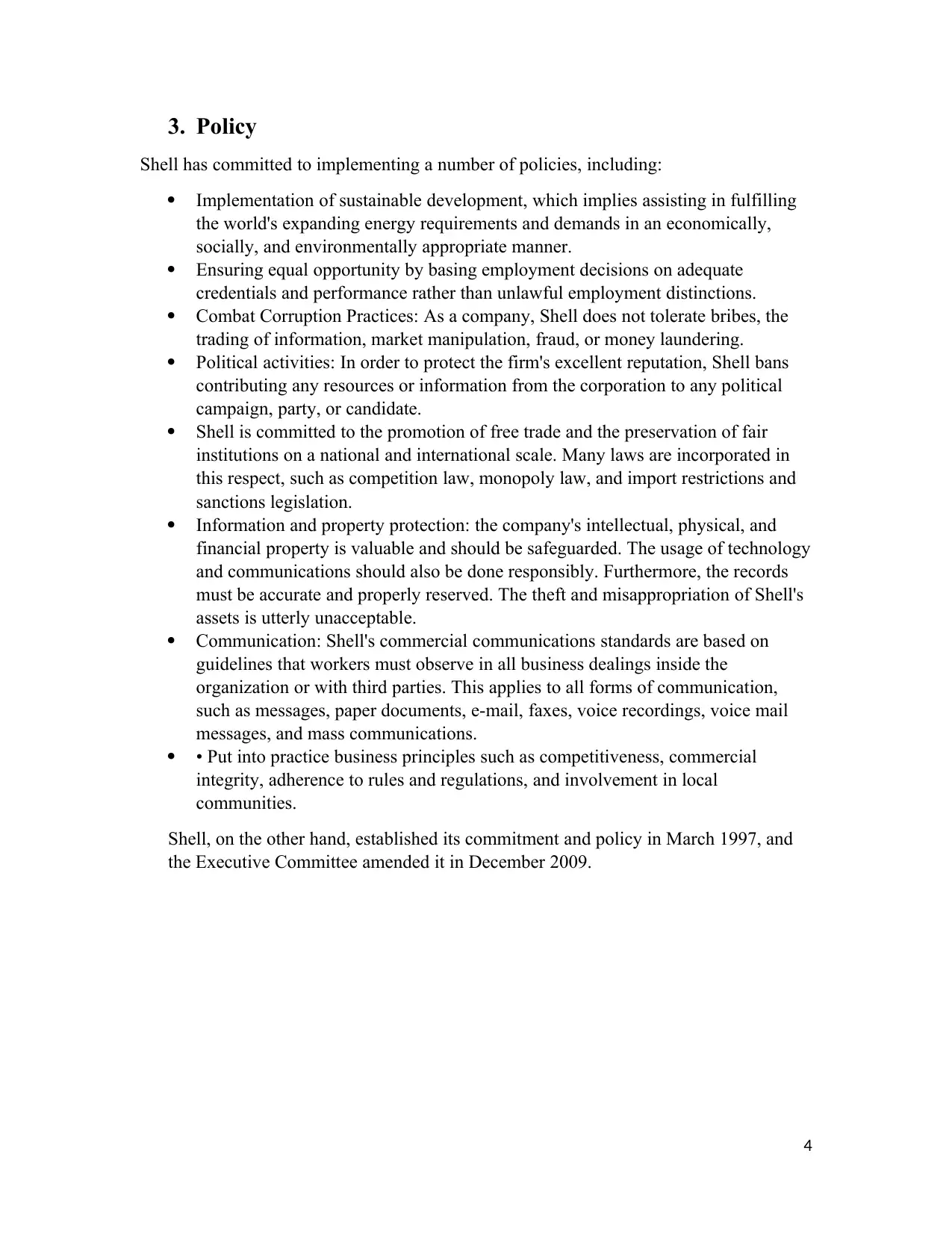
3. Policy
Shell has committed to implementing a number of policies, including:
Implementation of sustainable development, which implies assisting in fulfilling
the world's expanding energy requirements and demands in an economically,
socially, and environmentally appropriate manner.
Ensuring equal opportunity by basing employment decisions on adequate
credentials and performance rather than unlawful employment distinctions.
Combat Corruption Practices: As a company, Shell does not tolerate bribes, the
trading of information, market manipulation, fraud, or money laundering.
Political activities: In order to protect the firm's excellent reputation, Shell bans
contributing any resources or information from the corporation to any political
campaign, party, or candidate.
Shell is committed to the promotion of free trade and the preservation of fair
institutions on a national and international scale. Many laws are incorporated in
this respect, such as competition law, monopoly law, and import restrictions and
sanctions legislation.
Information and property protection: the company's intellectual, physical, and
financial property is valuable and should be safeguarded. The usage of technology
and communications should also be done responsibly. Furthermore, the records
must be accurate and properly reserved. The theft and misappropriation of Shell's
assets is utterly unacceptable.
Communication: Shell's commercial communications standards are based on
guidelines that workers must observe in all business dealings inside the
organization or with third parties. This applies to all forms of communication,
such as messages, paper documents, e-mail, faxes, voice recordings, voice mail
messages, and mass communications.
• Put into practice business principles such as competitiveness, commercial
integrity, adherence to rules and regulations, and involvement in local
communities.
Shell, on the other hand, established its commitment and policy in March 1997, and
the Executive Committee amended it in December 2009.
4
Shell has committed to implementing a number of policies, including:
Implementation of sustainable development, which implies assisting in fulfilling
the world's expanding energy requirements and demands in an economically,
socially, and environmentally appropriate manner.
Ensuring equal opportunity by basing employment decisions on adequate
credentials and performance rather than unlawful employment distinctions.
Combat Corruption Practices: As a company, Shell does not tolerate bribes, the
trading of information, market manipulation, fraud, or money laundering.
Political activities: In order to protect the firm's excellent reputation, Shell bans
contributing any resources or information from the corporation to any political
campaign, party, or candidate.
Shell is committed to the promotion of free trade and the preservation of fair
institutions on a national and international scale. Many laws are incorporated in
this respect, such as competition law, monopoly law, and import restrictions and
sanctions legislation.
Information and property protection: the company's intellectual, physical, and
financial property is valuable and should be safeguarded. The usage of technology
and communications should also be done responsibly. Furthermore, the records
must be accurate and properly reserved. The theft and misappropriation of Shell's
assets is utterly unacceptable.
Communication: Shell's commercial communications standards are based on
guidelines that workers must observe in all business dealings inside the
organization or with third parties. This applies to all forms of communication,
such as messages, paper documents, e-mail, faxes, voice recordings, voice mail
messages, and mass communications.
• Put into practice business principles such as competitiveness, commercial
integrity, adherence to rules and regulations, and involvement in local
communities.
Shell, on the other hand, established its commitment and policy in March 1997, and
the Executive Committee amended it in December 2009.
4
Paraphrase This Document
Need a fresh take? Get an instant paraphrase of this document with our AI Paraphraser
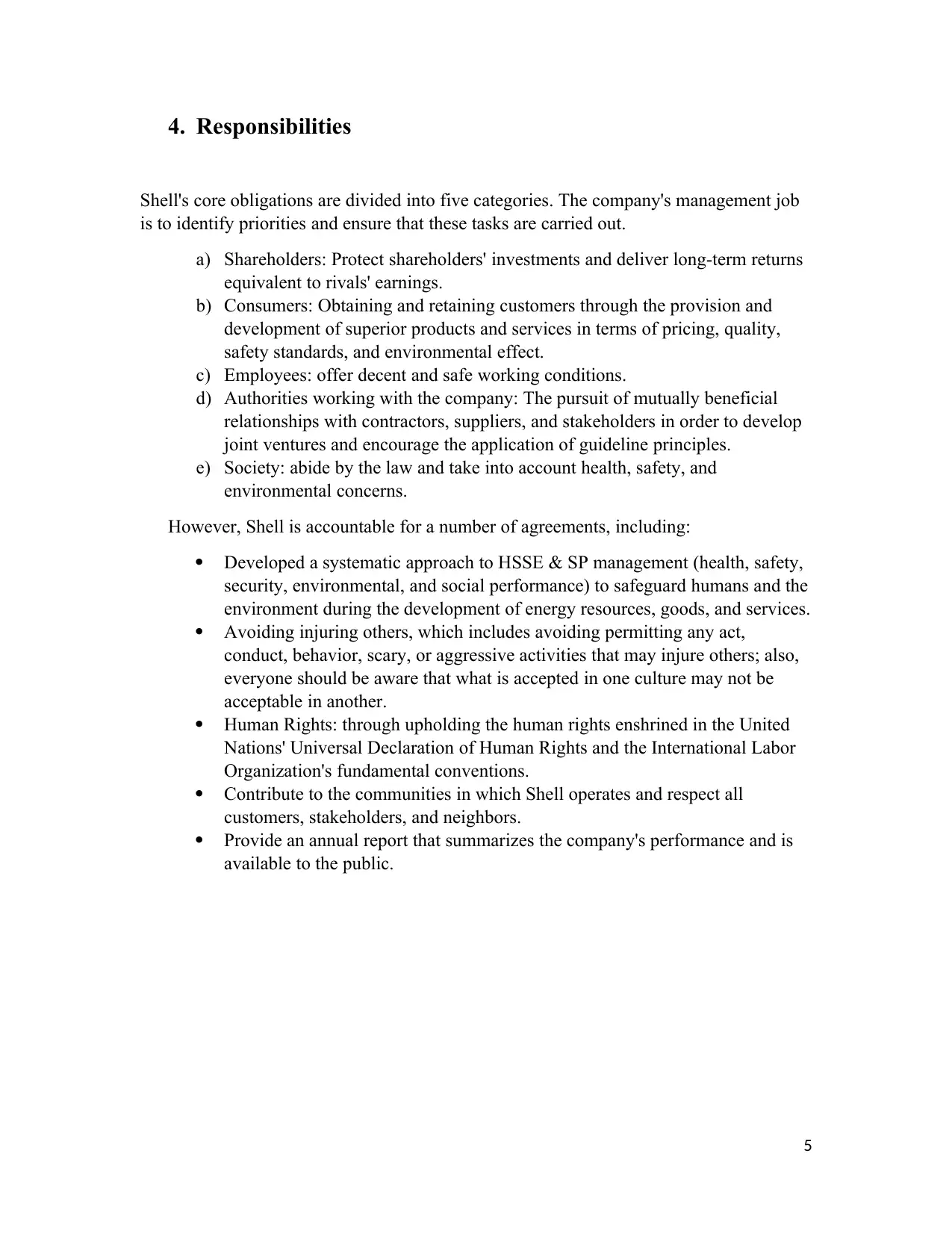
4. Responsibilities
Shell's core obligations are divided into five categories. The company's management job
is to identify priorities and ensure that these tasks are carried out.
a) Shareholders: Protect shareholders' investments and deliver long-term returns
equivalent to rivals' earnings.
b) Consumers: Obtaining and retaining customers through the provision and
development of superior products and services in terms of pricing, quality,
safety standards, and environmental effect.
c) Employees: offer decent and safe working conditions.
d) Authorities working with the company: The pursuit of mutually beneficial
relationships with contractors, suppliers, and stakeholders in order to develop
joint ventures and encourage the application of guideline principles.
e) Society: abide by the law and take into account health, safety, and
environmental concerns.
However, Shell is accountable for a number of agreements, including:
Developed a systematic approach to HSSE & SP management (health, safety,
security, environmental, and social performance) to safeguard humans and the
environment during the development of energy resources, goods, and services.
Avoiding injuring others, which includes avoiding permitting any act,
conduct, behavior, scary, or aggressive activities that may injure others; also,
everyone should be aware that what is accepted in one culture may not be
acceptable in another.
Human Rights: through upholding the human rights enshrined in the United
Nations' Universal Declaration of Human Rights and the International Labor
Organization's fundamental conventions.
Contribute to the communities in which Shell operates and respect all
customers, stakeholders, and neighbors.
Provide an annual report that summarizes the company's performance and is
available to the public.
5
Shell's core obligations are divided into five categories. The company's management job
is to identify priorities and ensure that these tasks are carried out.
a) Shareholders: Protect shareholders' investments and deliver long-term returns
equivalent to rivals' earnings.
b) Consumers: Obtaining and retaining customers through the provision and
development of superior products and services in terms of pricing, quality,
safety standards, and environmental effect.
c) Employees: offer decent and safe working conditions.
d) Authorities working with the company: The pursuit of mutually beneficial
relationships with contractors, suppliers, and stakeholders in order to develop
joint ventures and encourage the application of guideline principles.
e) Society: abide by the law and take into account health, safety, and
environmental concerns.
However, Shell is accountable for a number of agreements, including:
Developed a systematic approach to HSSE & SP management (health, safety,
security, environmental, and social performance) to safeguard humans and the
environment during the development of energy resources, goods, and services.
Avoiding injuring others, which includes avoiding permitting any act,
conduct, behavior, scary, or aggressive activities that may injure others; also,
everyone should be aware that what is accepted in one culture may not be
acceptable in another.
Human Rights: through upholding the human rights enshrined in the United
Nations' Universal Declaration of Human Rights and the International Labor
Organization's fundamental conventions.
Contribute to the communities in which Shell operates and respect all
customers, stakeholders, and neighbors.
Provide an annual report that summarizes the company's performance and is
available to the public.
5
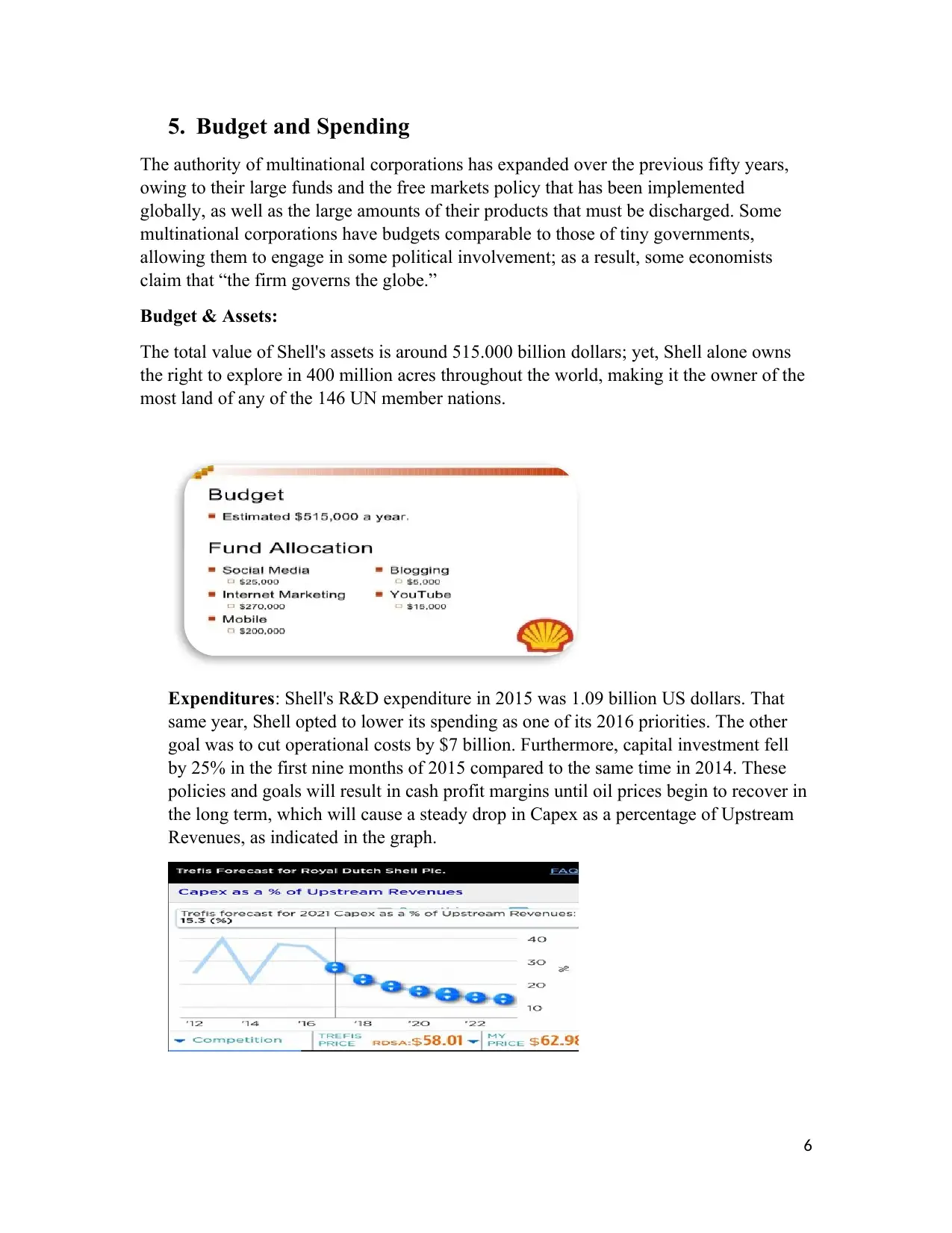
5. Budget and Spending
The authority of multinational corporations has expanded over the previous fifty years,
owing to their large funds and the free markets policy that has been implemented
globally, as well as the large amounts of their products that must be discharged. Some
multinational corporations have budgets comparable to those of tiny governments,
allowing them to engage in some political involvement; as a result, some economists
claim that “the firm governs the globe.”
Budget & Assets:
The total value of Shell's assets is around 515.000 billion dollars; yet, Shell alone owns
the right to explore in 400 million acres throughout the world, making it the owner of the
most land of any of the 146 UN member nations.
Expenditures: Shell's R&D expenditure in 2015 was 1.09 billion US dollars. That
same year, Shell opted to lower its spending as one of its 2016 priorities. The other
goal was to cut operational costs by $7 billion. Furthermore, capital investment fell
by 25% in the first nine months of 2015 compared to the same time in 2014. These
policies and goals will result in cash profit margins until oil prices begin to recover in
the long term, which will cause a steady drop in Capex as a percentage of Upstream
Revenues, as indicated in the graph.
6
The authority of multinational corporations has expanded over the previous fifty years,
owing to their large funds and the free markets policy that has been implemented
globally, as well as the large amounts of their products that must be discharged. Some
multinational corporations have budgets comparable to those of tiny governments,
allowing them to engage in some political involvement; as a result, some economists
claim that “the firm governs the globe.”
Budget & Assets:
The total value of Shell's assets is around 515.000 billion dollars; yet, Shell alone owns
the right to explore in 400 million acres throughout the world, making it the owner of the
most land of any of the 146 UN member nations.
Expenditures: Shell's R&D expenditure in 2015 was 1.09 billion US dollars. That
same year, Shell opted to lower its spending as one of its 2016 priorities. The other
goal was to cut operational costs by $7 billion. Furthermore, capital investment fell
by 25% in the first nine months of 2015 compared to the same time in 2014. These
policies and goals will result in cash profit margins until oil prices begin to recover in
the long term, which will cause a steady drop in Capex as a percentage of Upstream
Revenues, as indicated in the graph.
6
⊘ This is a preview!⊘
Do you want full access?
Subscribe today to unlock all pages.

Trusted by 1+ million students worldwide
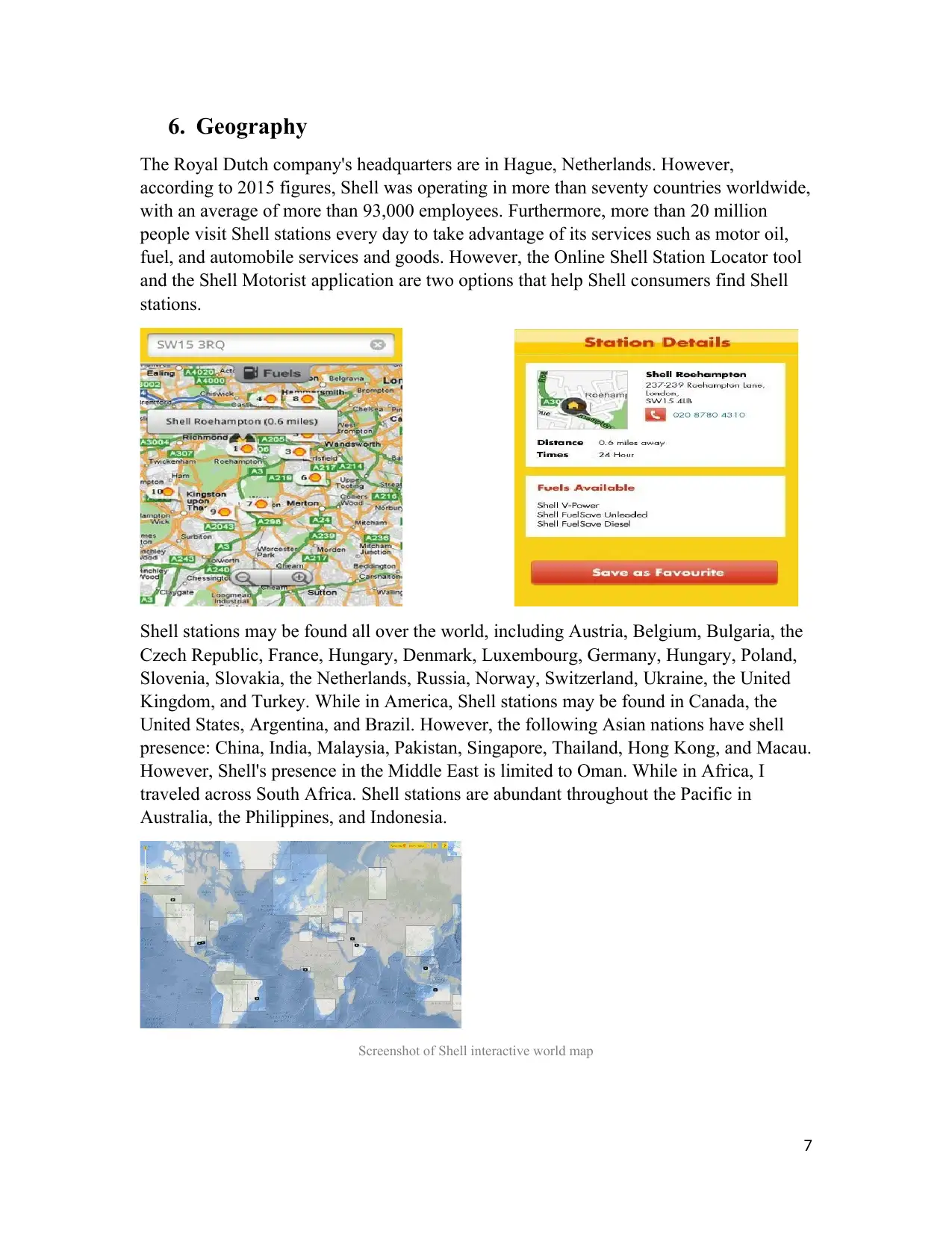
6. Geography
The Royal Dutch company's headquarters are in Hague, Netherlands. However,
according to 2015 figures, Shell was operating in more than seventy countries worldwide,
with an average of more than 93,000 employees. Furthermore, more than 20 million
people visit Shell stations every day to take advantage of its services such as motor oil,
fuel, and automobile services and goods. However, the Online Shell Station Locator tool
and the Shell Motorist application are two options that help Shell consumers find Shell
stations.
Shell stations may be found all over the world, including Austria, Belgium, Bulgaria, the
Czech Republic, France, Hungary, Denmark, Luxembourg, Germany, Hungary, Poland,
Slovenia, Slovakia, the Netherlands, Russia, Norway, Switzerland, Ukraine, the United
Kingdom, and Turkey. While in America, Shell stations may be found in Canada, the
United States, Argentina, and Brazil. However, the following Asian nations have shell
presence: China, India, Malaysia, Pakistan, Singapore, Thailand, Hong Kong, and Macau.
However, Shell's presence in the Middle East is limited to Oman. While in Africa, I
traveled across South Africa. Shell stations are abundant throughout the Pacific in
Australia, the Philippines, and Indonesia.
Screenshot of Shell interactive world map
7
The Royal Dutch company's headquarters are in Hague, Netherlands. However,
according to 2015 figures, Shell was operating in more than seventy countries worldwide,
with an average of more than 93,000 employees. Furthermore, more than 20 million
people visit Shell stations every day to take advantage of its services such as motor oil,
fuel, and automobile services and goods. However, the Online Shell Station Locator tool
and the Shell Motorist application are two options that help Shell consumers find Shell
stations.
Shell stations may be found all over the world, including Austria, Belgium, Bulgaria, the
Czech Republic, France, Hungary, Denmark, Luxembourg, Germany, Hungary, Poland,
Slovenia, Slovakia, the Netherlands, Russia, Norway, Switzerland, Ukraine, the United
Kingdom, and Turkey. While in America, Shell stations may be found in Canada, the
United States, Argentina, and Brazil. However, the following Asian nations have shell
presence: China, India, Malaysia, Pakistan, Singapore, Thailand, Hong Kong, and Macau.
However, Shell's presence in the Middle East is limited to Oman. While in Africa, I
traveled across South Africa. Shell stations are abundant throughout the Pacific in
Australia, the Philippines, and Indonesia.
Screenshot of Shell interactive world map
7
Paraphrase This Document
Need a fresh take? Get an instant paraphrase of this document with our AI Paraphraser
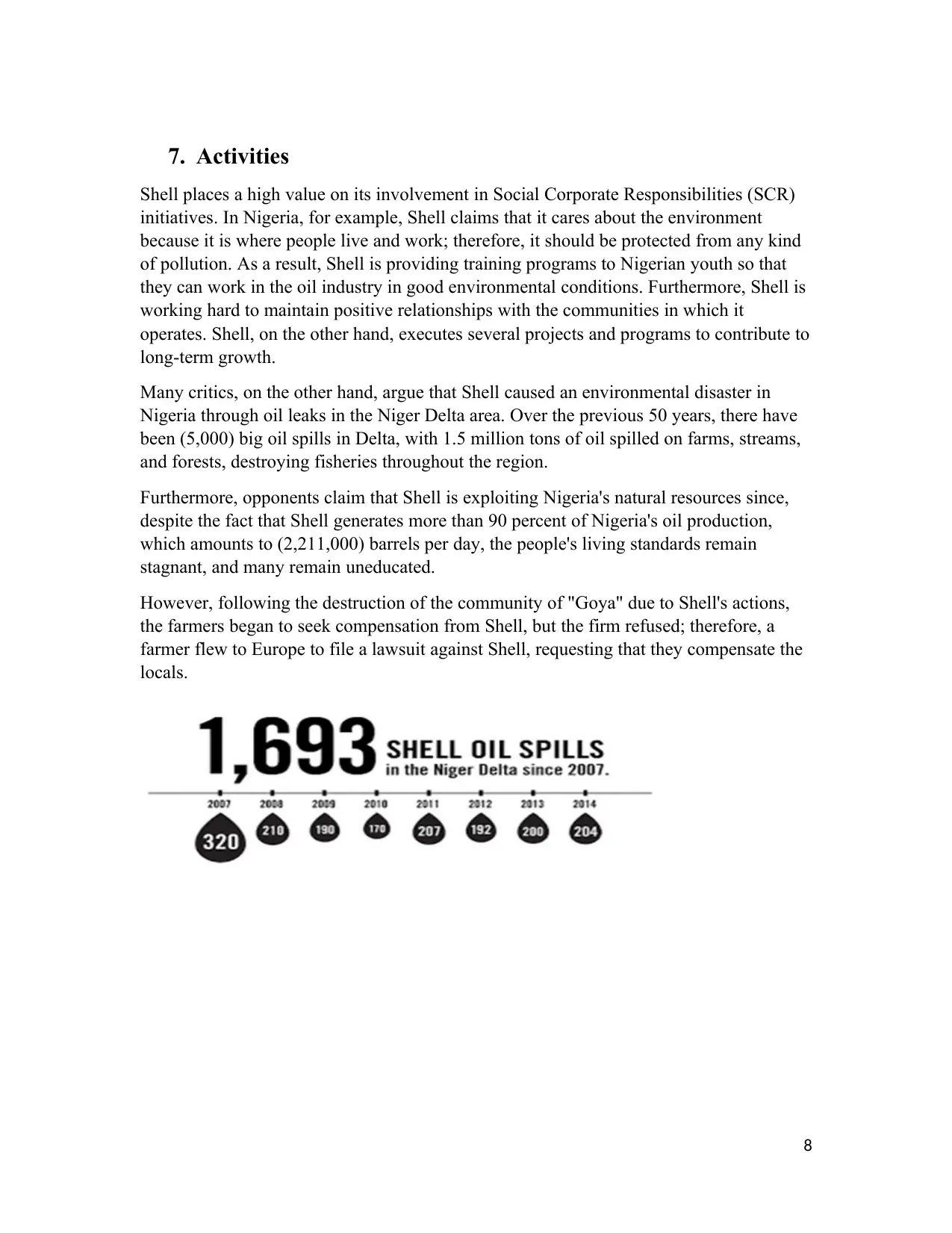
7. Activities
Shell places a high value on its involvement in Social Corporate Responsibilities (SCR)
initiatives. In Nigeria, for example, Shell claims that it cares about the environment
because it is where people live and work; therefore, it should be protected from any kind
of pollution. As a result, Shell is providing training programs to Nigerian youth so that
they can work in the oil industry in good environmental conditions. Furthermore, Shell is
working hard to maintain positive relationships with the communities in which it
operates. Shell, on the other hand, executes several projects and programs to contribute to
long-term growth.
Many critics, on the other hand, argue that Shell caused an environmental disaster in
Nigeria through oil leaks in the Niger Delta area. Over the previous 50 years, there have
been (5,000) big oil spills in Delta, with 1.5 million tons of oil spilled on farms, streams,
and forests, destroying fisheries throughout the region.
Furthermore, opponents claim that Shell is exploiting Nigeria's natural resources since,
despite the fact that Shell generates more than 90 percent of Nigeria's oil production,
which amounts to (2,211,000) barrels per day, the people's living standards remain
stagnant, and many remain uneducated.
However, following the destruction of the community of "Goya" due to Shell's actions,
the farmers began to seek compensation from Shell, but the firm refused; therefore, a
farmer flew to Europe to file a lawsuit against Shell, requesting that they compensate the
locals.
8
Shell places a high value on its involvement in Social Corporate Responsibilities (SCR)
initiatives. In Nigeria, for example, Shell claims that it cares about the environment
because it is where people live and work; therefore, it should be protected from any kind
of pollution. As a result, Shell is providing training programs to Nigerian youth so that
they can work in the oil industry in good environmental conditions. Furthermore, Shell is
working hard to maintain positive relationships with the communities in which it
operates. Shell, on the other hand, executes several projects and programs to contribute to
long-term growth.
Many critics, on the other hand, argue that Shell caused an environmental disaster in
Nigeria through oil leaks in the Niger Delta area. Over the previous 50 years, there have
been (5,000) big oil spills in Delta, with 1.5 million tons of oil spilled on farms, streams,
and forests, destroying fisheries throughout the region.
Furthermore, opponents claim that Shell is exploiting Nigeria's natural resources since,
despite the fact that Shell generates more than 90 percent of Nigeria's oil production,
which amounts to (2,211,000) barrels per day, the people's living standards remain
stagnant, and many remain uneducated.
However, following the destruction of the community of "Goya" due to Shell's actions,
the farmers began to seek compensation from Shell, but the firm refused; therefore, a
farmer flew to Europe to file a lawsuit against Shell, requesting that they compensate the
locals.
8
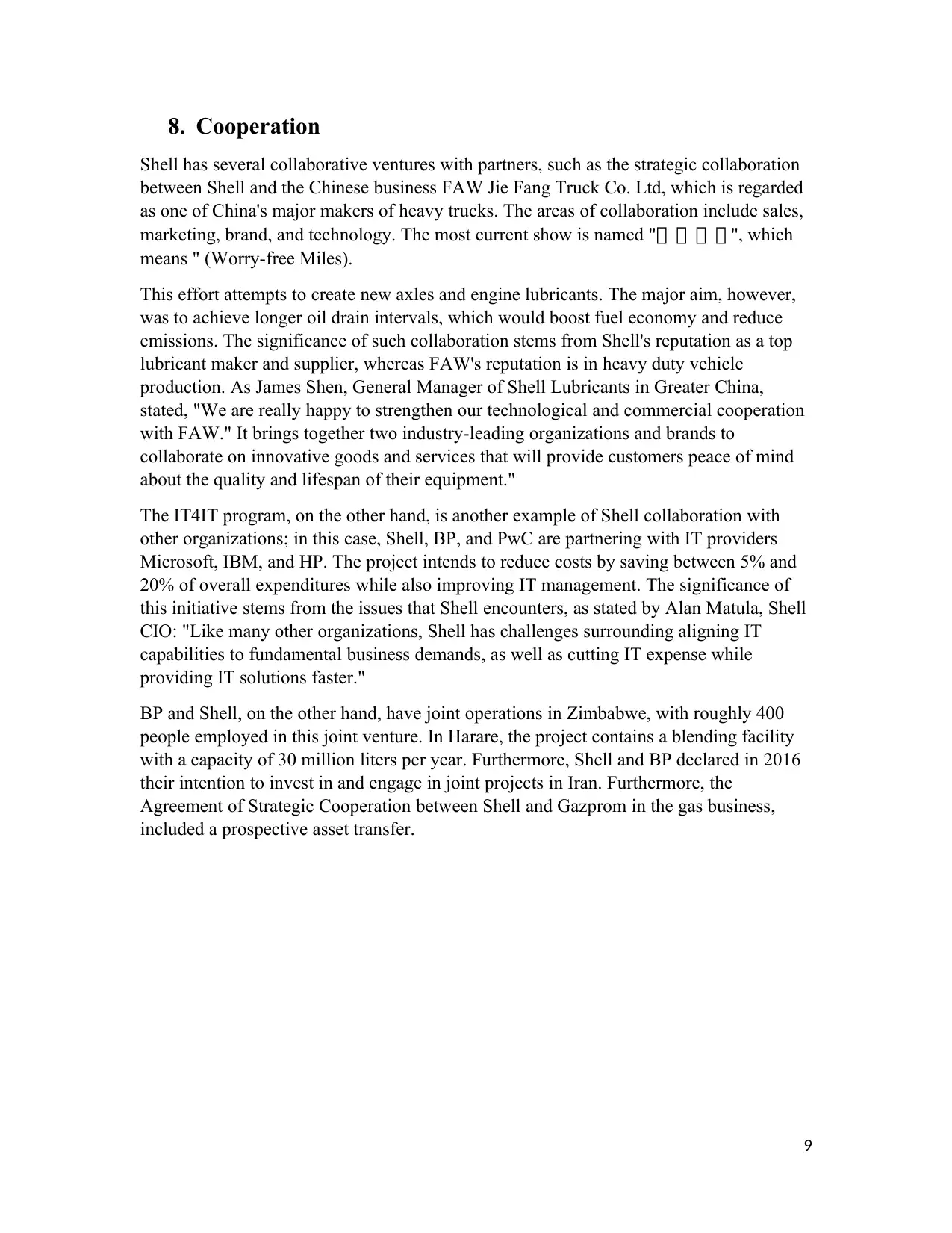
8. Cooperation
Shell has several collaborative ventures with partners, such as the strategic collaboration
between Shell and the Chinese business FAW Jie Fang Truck Co. Ltd, which is regarded
as one of China's major makers of heavy trucks. The areas of collaboration include sales,
marketing, brand, and technology. The most current show is named "万 万 万 万 ", which
means " (Worry-free Miles).
This effort attempts to create new axles and engine lubricants. The major aim, however,
was to achieve longer oil drain intervals, which would boost fuel economy and reduce
emissions. The significance of such collaboration stems from Shell's reputation as a top
lubricant maker and supplier, whereas FAW's reputation is in heavy duty vehicle
production. As James Shen, General Manager of Shell Lubricants in Greater China,
stated, "We are really happy to strengthen our technological and commercial cooperation
with FAW." It brings together two industry-leading organizations and brands to
collaborate on innovative goods and services that will provide customers peace of mind
about the quality and lifespan of their equipment."
The IT4IT program, on the other hand, is another example of Shell collaboration with
other organizations; in this case, Shell, BP, and PwC are partnering with IT providers
Microsoft, IBM, and HP. The project intends to reduce costs by saving between 5% and
20% of overall expenditures while also improving IT management. The significance of
this initiative stems from the issues that Shell encounters, as stated by Alan Matula, Shell
CIO: "Like many other organizations, Shell has challenges surrounding aligning IT
capabilities to fundamental business demands, as well as cutting IT expense while
providing IT solutions faster."
BP and Shell, on the other hand, have joint operations in Zimbabwe, with roughly 400
people employed in this joint venture. In Harare, the project contains a blending facility
with a capacity of 30 million liters per year. Furthermore, Shell and BP declared in 2016
their intention to invest in and engage in joint projects in Iran. Furthermore, the
Agreement of Strategic Cooperation between Shell and Gazprom in the gas business,
included a prospective asset transfer.
9
Shell has several collaborative ventures with partners, such as the strategic collaboration
between Shell and the Chinese business FAW Jie Fang Truck Co. Ltd, which is regarded
as one of China's major makers of heavy trucks. The areas of collaboration include sales,
marketing, brand, and technology. The most current show is named "万 万 万 万 ", which
means " (Worry-free Miles).
This effort attempts to create new axles and engine lubricants. The major aim, however,
was to achieve longer oil drain intervals, which would boost fuel economy and reduce
emissions. The significance of such collaboration stems from Shell's reputation as a top
lubricant maker and supplier, whereas FAW's reputation is in heavy duty vehicle
production. As James Shen, General Manager of Shell Lubricants in Greater China,
stated, "We are really happy to strengthen our technological and commercial cooperation
with FAW." It brings together two industry-leading organizations and brands to
collaborate on innovative goods and services that will provide customers peace of mind
about the quality and lifespan of their equipment."
The IT4IT program, on the other hand, is another example of Shell collaboration with
other organizations; in this case, Shell, BP, and PwC are partnering with IT providers
Microsoft, IBM, and HP. The project intends to reduce costs by saving between 5% and
20% of overall expenditures while also improving IT management. The significance of
this initiative stems from the issues that Shell encounters, as stated by Alan Matula, Shell
CIO: "Like many other organizations, Shell has challenges surrounding aligning IT
capabilities to fundamental business demands, as well as cutting IT expense while
providing IT solutions faster."
BP and Shell, on the other hand, have joint operations in Zimbabwe, with roughly 400
people employed in this joint venture. In Harare, the project contains a blending facility
with a capacity of 30 million liters per year. Furthermore, Shell and BP declared in 2016
their intention to invest in and engage in joint projects in Iran. Furthermore, the
Agreement of Strategic Cooperation between Shell and Gazprom in the gas business,
included a prospective asset transfer.
9
⊘ This is a preview!⊘
Do you want full access?
Subscribe today to unlock all pages.

Trusted by 1+ million students worldwide
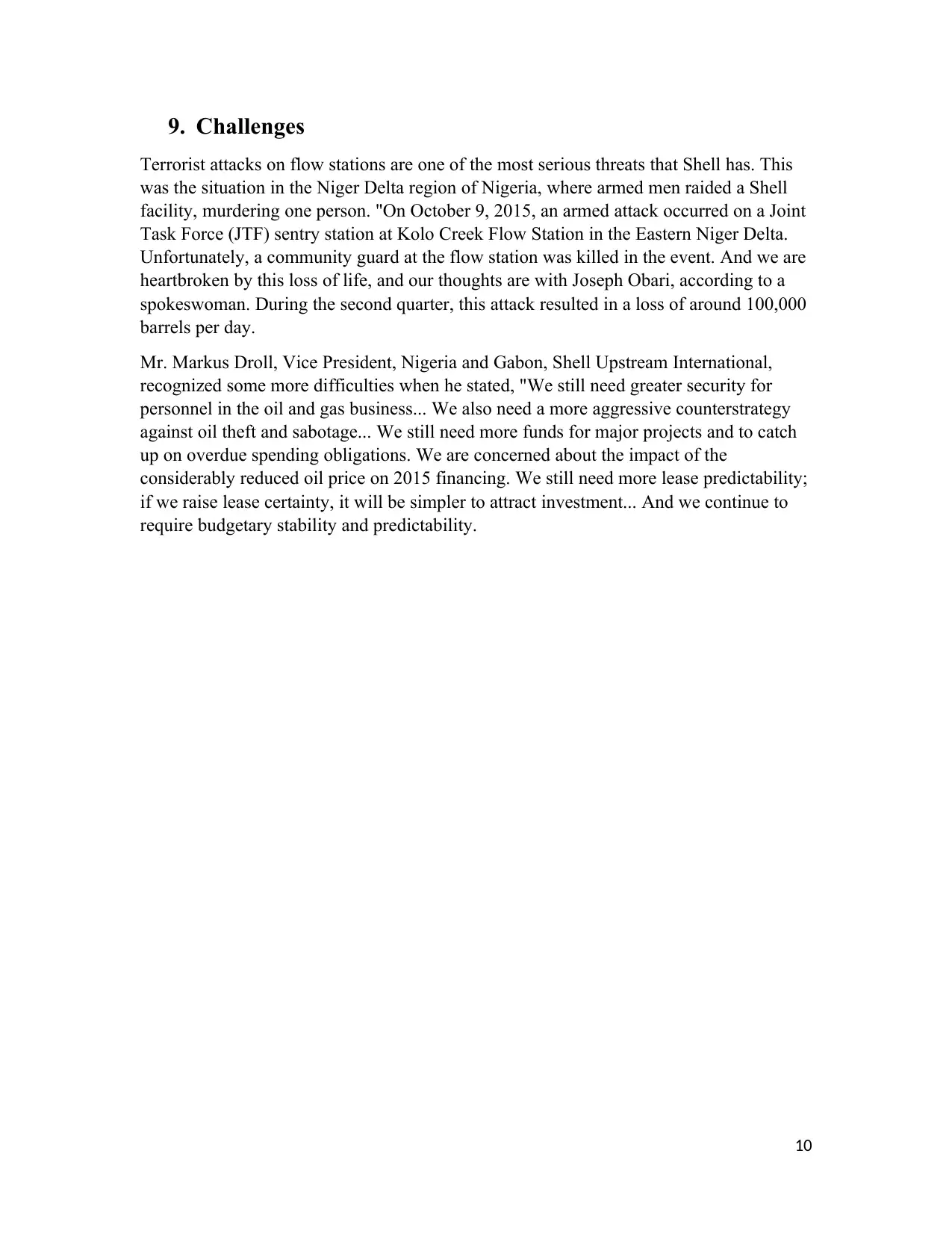
9. Challenges
Terrorist attacks on flow stations are one of the most serious threats that Shell has. This
was the situation in the Niger Delta region of Nigeria, where armed men raided a Shell
facility, murdering one person. "On October 9, 2015, an armed attack occurred on a Joint
Task Force (JTF) sentry station at Kolo Creek Flow Station in the Eastern Niger Delta.
Unfortunately, a community guard at the flow station was killed in the event. And we are
heartbroken by this loss of life, and our thoughts are with Joseph Obari, according to a
spokeswoman. During the second quarter, this attack resulted in a loss of around 100,000
barrels per day.
Mr. Markus Droll, Vice President, Nigeria and Gabon, Shell Upstream International,
recognized some more difficulties when he stated, "We still need greater security for
personnel in the oil and gas business... We also need a more aggressive counterstrategy
against oil theft and sabotage... We still need more funds for major projects and to catch
up on overdue spending obligations. We are concerned about the impact of the
considerably reduced oil price on 2015 financing. We still need more lease predictability;
if we raise lease certainty, it will be simpler to attract investment... And we continue to
require budgetary stability and predictability.
10
Terrorist attacks on flow stations are one of the most serious threats that Shell has. This
was the situation in the Niger Delta region of Nigeria, where armed men raided a Shell
facility, murdering one person. "On October 9, 2015, an armed attack occurred on a Joint
Task Force (JTF) sentry station at Kolo Creek Flow Station in the Eastern Niger Delta.
Unfortunately, a community guard at the flow station was killed in the event. And we are
heartbroken by this loss of life, and our thoughts are with Joseph Obari, according to a
spokeswoman. During the second quarter, this attack resulted in a loss of around 100,000
barrels per day.
Mr. Markus Droll, Vice President, Nigeria and Gabon, Shell Upstream International,
recognized some more difficulties when he stated, "We still need greater security for
personnel in the oil and gas business... We also need a more aggressive counterstrategy
against oil theft and sabotage... We still need more funds for major projects and to catch
up on overdue spending obligations. We are concerned about the impact of the
considerably reduced oil price on 2015 financing. We still need more lease predictability;
if we raise lease certainty, it will be simpler to attract investment... And we continue to
require budgetary stability and predictability.
10
Paraphrase This Document
Need a fresh take? Get an instant paraphrase of this document with our AI Paraphraser
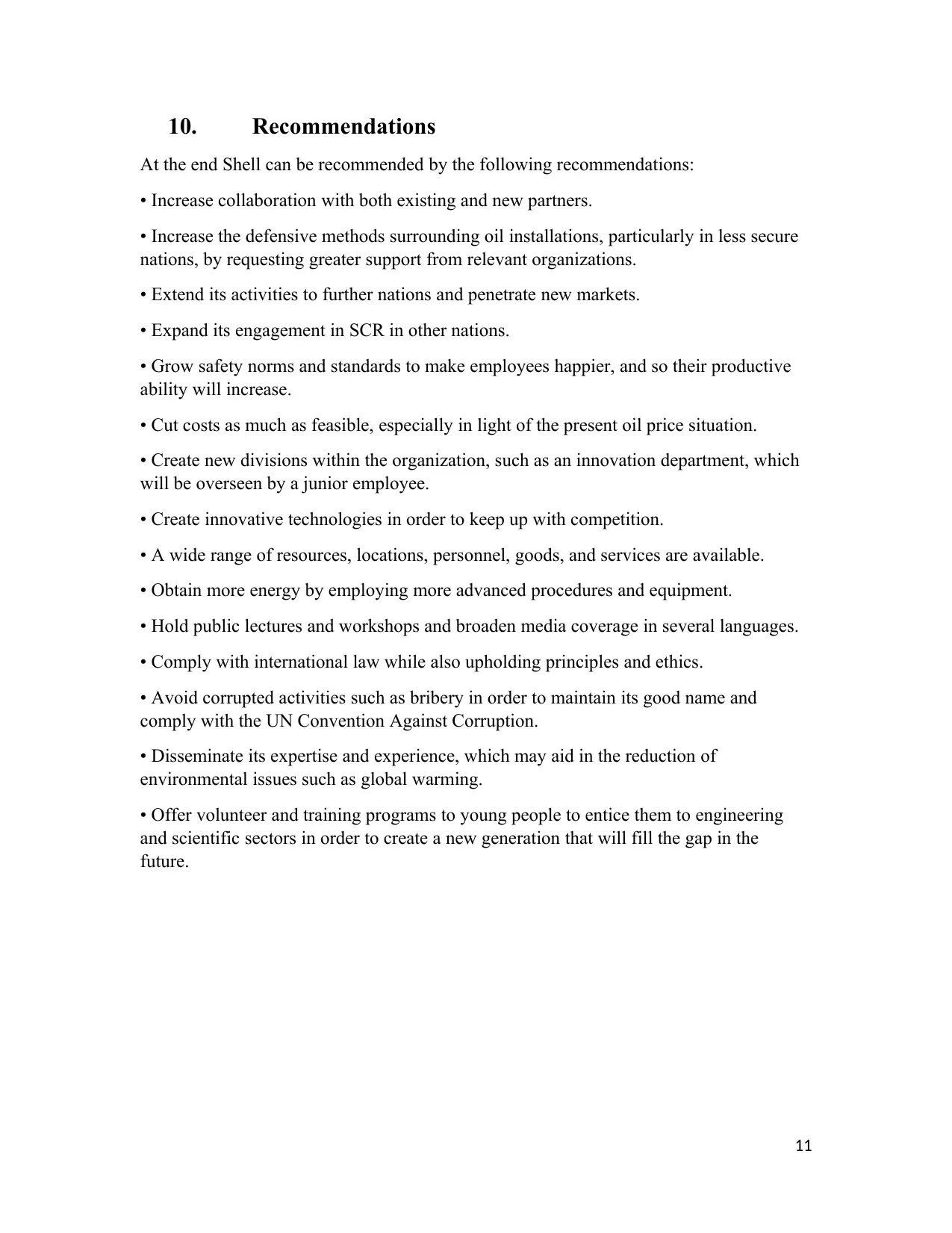
10. Recommendations
At the end Shell can be recommended by the following recommendations:
• Increase collaboration with both existing and new partners.
• Increase the defensive methods surrounding oil installations, particularly in less secure
nations, by requesting greater support from relevant organizations.
• Extend its activities to further nations and penetrate new markets.
• Expand its engagement in SCR in other nations.
• Grow safety norms and standards to make employees happier, and so their productive
ability will increase.
• Cut costs as much as feasible, especially in light of the present oil price situation.
• Create new divisions within the organization, such as an innovation department, which
will be overseen by a junior employee.
• Create innovative technologies in order to keep up with competition.
• A wide range of resources, locations, personnel, goods, and services are available.
• Obtain more energy by employing more advanced procedures and equipment.
• Hold public lectures and workshops and broaden media coverage in several languages.
• Comply with international law while also upholding principles and ethics.
• Avoid corrupted activities such as bribery in order to maintain its good name and
comply with the UN Convention Against Corruption.
• Disseminate its expertise and experience, which may aid in the reduction of
environmental issues such as global warming.
• Offer volunteer and training programs to young people to entice them to engineering
and scientific sectors in order to create a new generation that will fill the gap in the
future.
11
At the end Shell can be recommended by the following recommendations:
• Increase collaboration with both existing and new partners.
• Increase the defensive methods surrounding oil installations, particularly in less secure
nations, by requesting greater support from relevant organizations.
• Extend its activities to further nations and penetrate new markets.
• Expand its engagement in SCR in other nations.
• Grow safety norms and standards to make employees happier, and so their productive
ability will increase.
• Cut costs as much as feasible, especially in light of the present oil price situation.
• Create new divisions within the organization, such as an innovation department, which
will be overseen by a junior employee.
• Create innovative technologies in order to keep up with competition.
• A wide range of resources, locations, personnel, goods, and services are available.
• Obtain more energy by employing more advanced procedures and equipment.
• Hold public lectures and workshops and broaden media coverage in several languages.
• Comply with international law while also upholding principles and ethics.
• Avoid corrupted activities such as bribery in order to maintain its good name and
comply with the UN Convention Against Corruption.
• Disseminate its expertise and experience, which may aid in the reduction of
environmental issues such as global warming.
• Offer volunteer and training programs to young people to entice them to engineering
and scientific sectors in order to create a new generation that will fill the gap in the
future.
11
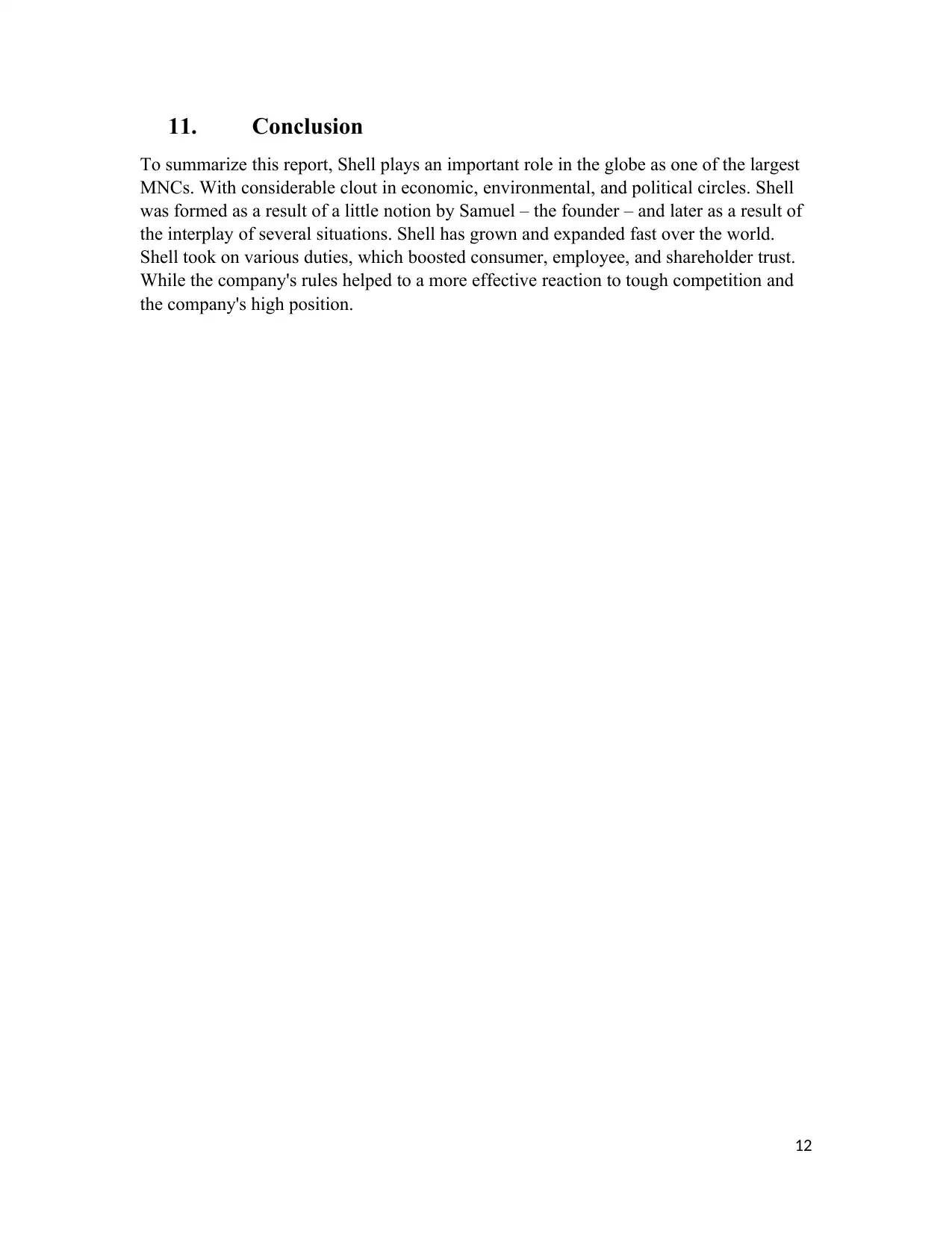
11. Conclusion
To summarize this report, Shell plays an important role in the globe as one of the largest
MNCs. With considerable clout in economic, environmental, and political circles. Shell
was formed as a result of a little notion by Samuel – the founder – and later as a result of
the interplay of several situations. Shell has grown and expanded fast over the world.
Shell took on various duties, which boosted consumer, employee, and shareholder trust.
While the company's rules helped to a more effective reaction to tough competition and
the company's high position.
12
To summarize this report, Shell plays an important role in the globe as one of the largest
MNCs. With considerable clout in economic, environmental, and political circles. Shell
was formed as a result of a little notion by Samuel – the founder – and later as a result of
the interplay of several situations. Shell has grown and expanded fast over the world.
Shell took on various duties, which boosted consumer, employee, and shareholder trust.
While the company's rules helped to a more effective reaction to tough competition and
the company's high position.
12
⊘ This is a preview!⊘
Do you want full access?
Subscribe today to unlock all pages.

Trusted by 1+ million students worldwide
1 out of 14
Related Documents
Your All-in-One AI-Powered Toolkit for Academic Success.
+13062052269
info@desklib.com
Available 24*7 on WhatsApp / Email
![[object Object]](/_next/static/media/star-bottom.7253800d.svg)
Unlock your academic potential
Copyright © 2020–2026 A2Z Services. All Rights Reserved. Developed and managed by ZUCOL.




